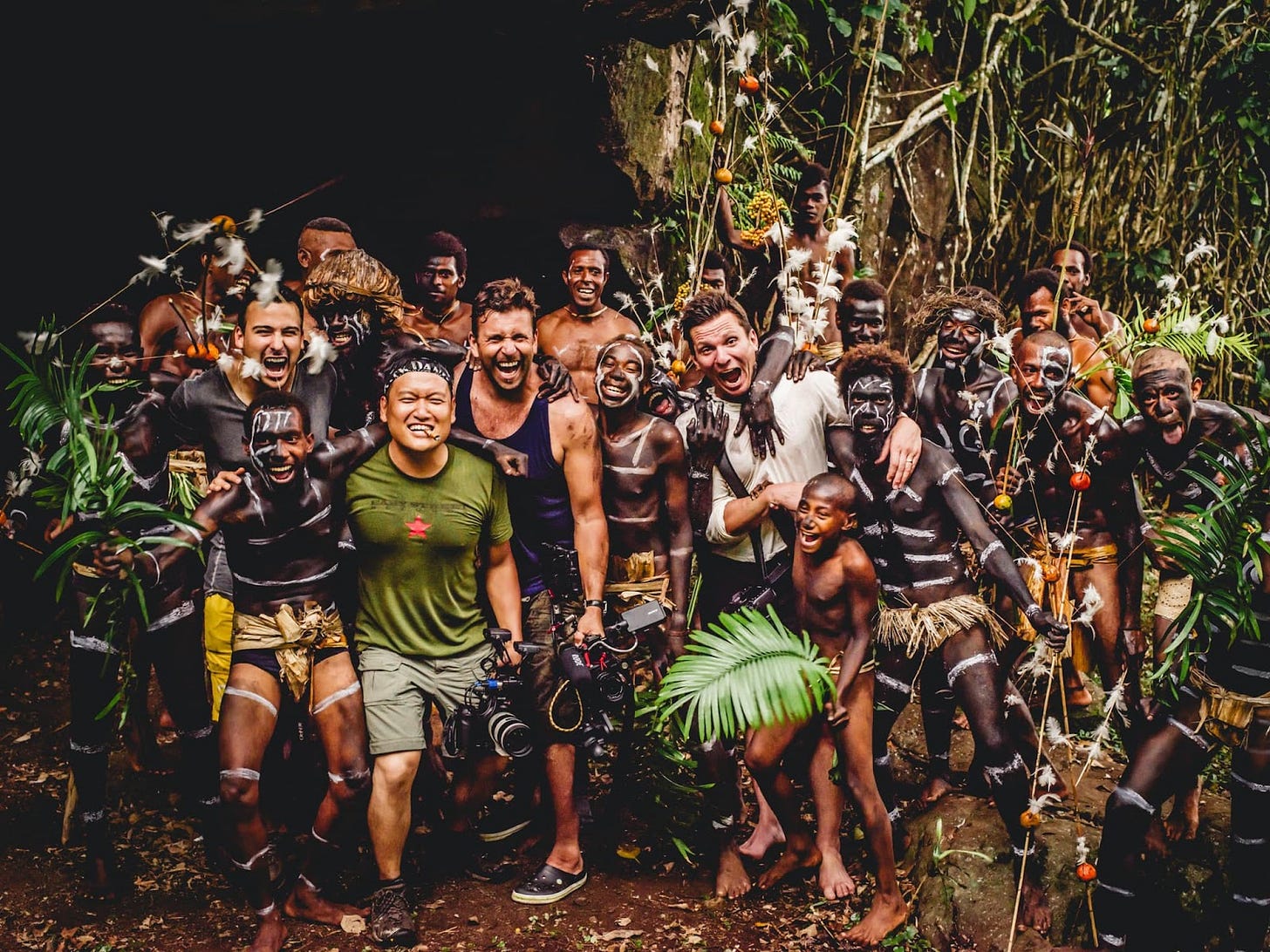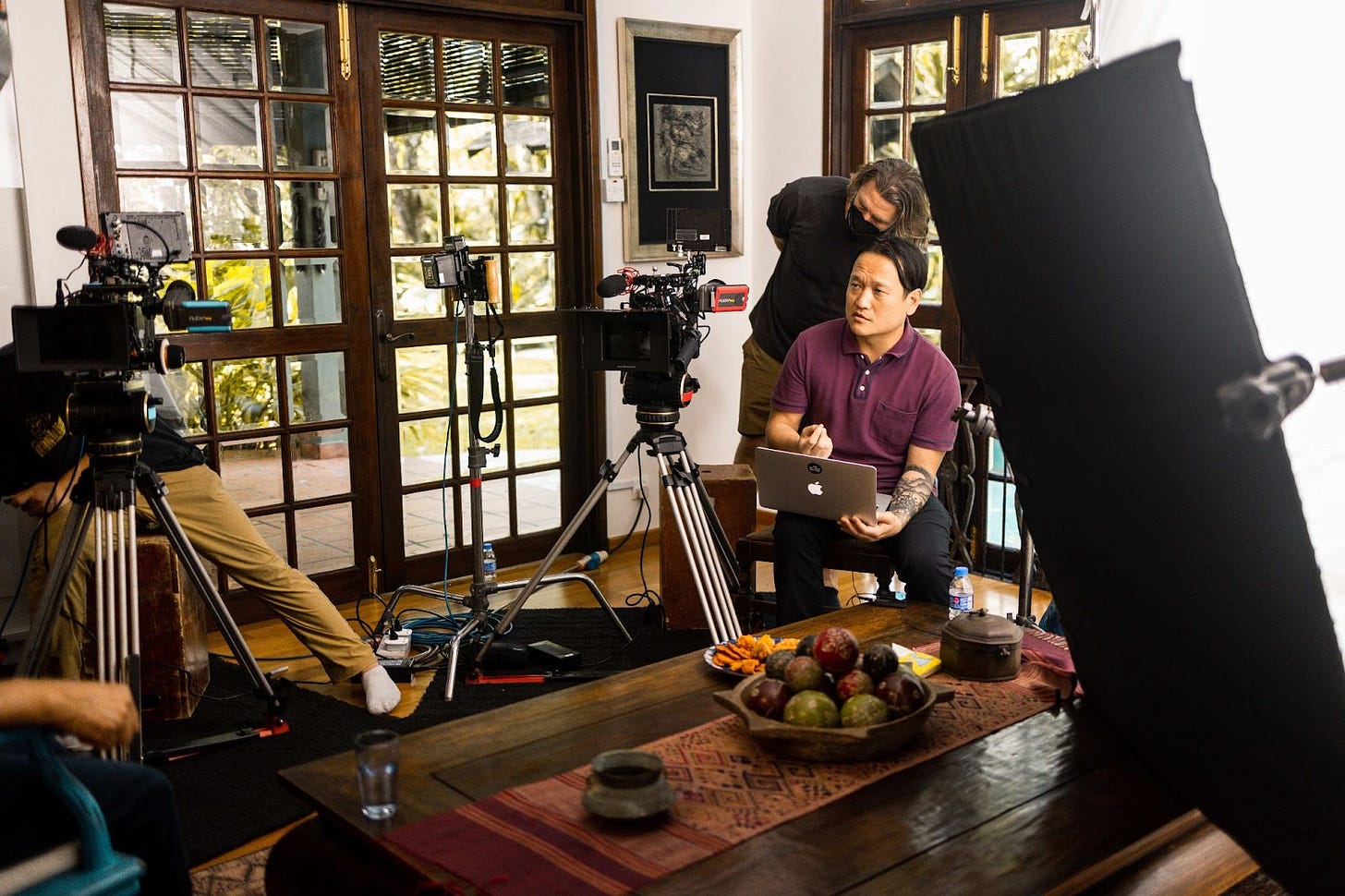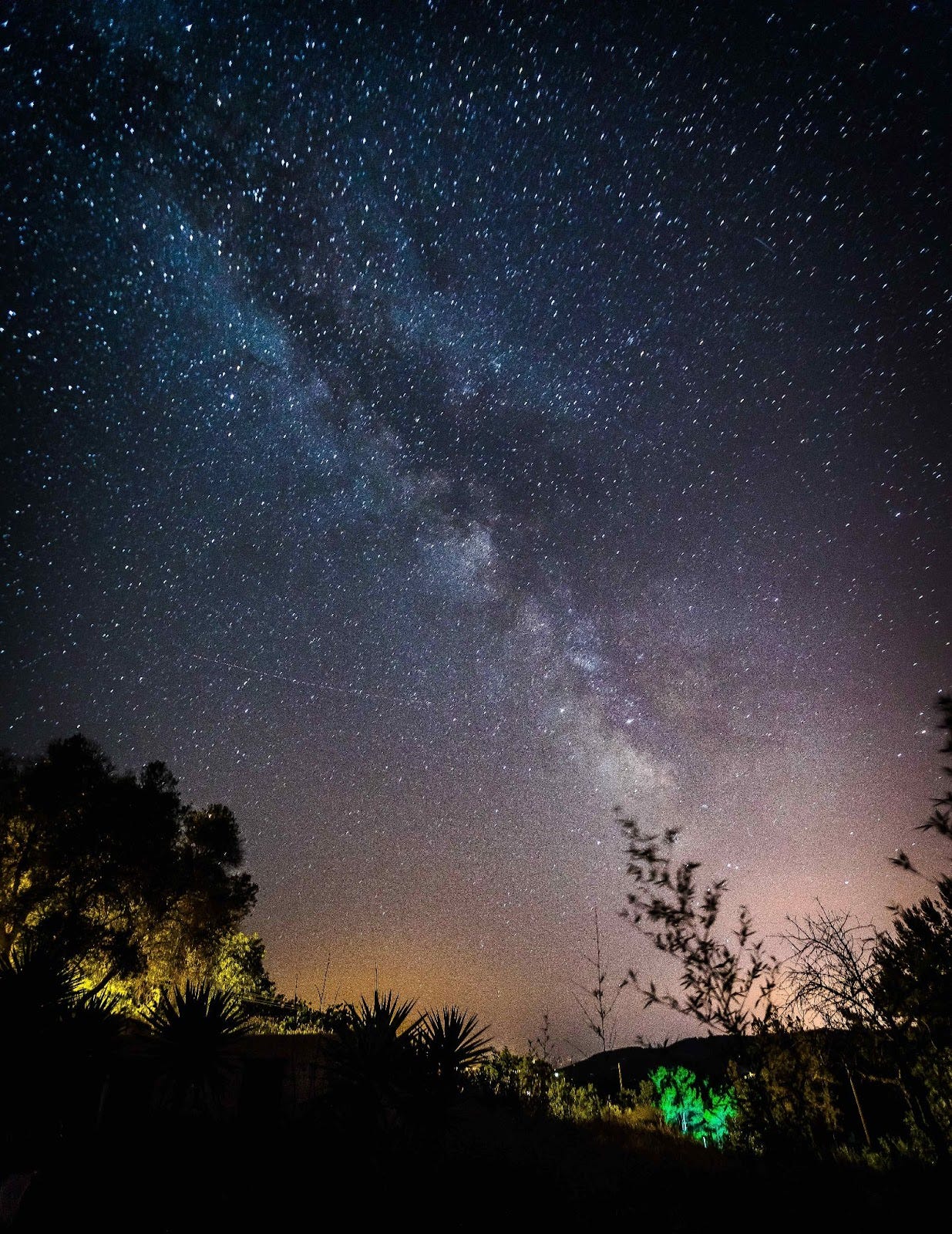Cassius Michael Kim (Director, Man on the Run) | Renegades
Uncovering good stories that lead to epic adventures
Welcome to Renegades, a series spotlighting Asian Pacific leaders and creatives who are carving their own paths and defying stereotypes along the way.
This week, we spotlight Cassius Michael Kim, director, producer, and founder of media company, The Smoking Section. Cassius shares with us how his background in international relations helped navigate global productions, memorable adventures while working on CNN’s The Wonder List, and the upcoming documentary, Man on the Run, which delves into the 1MDB scandal. Man on the Run premieres in London on September 8th.
What did you want to be when you were growing up, and how does that compare to what you do today?
Music was my first love. I have a very early memory of watching a live band performing on TV and rocking out, playing air guitar on a badminton racket. Growing up, I was always in a band and seriously considered taking a year off after high school to make music. An affinity for the arts runs in my family, and I always showed a creative bent, whether that was music, art, or movies.
Once I graduated college and was figuring out what I might want out of a career, I distilled it into a more basic tenet: I wanted to do something where I would have a tangible result to show for my time. Something I could leave behind before it all turns to dust. I couldn’t bear the thought of sitting behind a desk and punching buttons or moving papers around. I also wanted to get out and see the world and get paid to do it. Through a series of fortunate opportunities, I took a circuitous but very enjoyable route into what I do now.
As an undergraduate at Columbia, you studied political science and international relations. How did your academic background lead you to producing?
I wouldn’t necessarily say that my academic background led to producing; however, I’ve always been interested in how things work, and specifically how countries interact with each other at the policy level, which is why I majored in international relations. That’s a big reason why I was so focused early on in my career in getting involved in international work and covering stories in faraway places.
That background came in handy as I navigated international production, especially with The Wonder List and Man On The Run. As I worked on more and more stories about the societal impact of successful or, more often than not, unsuccessful governments, it became easier to understand and analyze the correlation between policy successes and failures and the ramifications they have on the people who live in these places.
While at CNN, you directed and produced three seasons of The Wonder List with Bill Weir. What was your favorite experience on this series, and what did you learn as a producer?
The main thing I learned as a producer was to hone my decision-making skills. Production is the end result of hundreds, if not thousands of decisions, and the trick is to not get hung up on any single one decision. Experience also lays the foundation of solid decision-making, so as you progress, you learn to both rely on your instincts borne of experience and also to do the best you can in the moment each time you’re confronted with a decision. Because even if you make the wrong decision, there will be many more decisions to be made.
As far as experiences, it’s difficult to narrow it down to just one favorite; it was a special time in all of our lives, going to these amazing far-flung places that most people never have the opportunity to see with their own eyes and also to embed so deeply with the locals, which allowed us to experience these places in a way that tourists typically can’t.
I often tell people about Reef Island, one of many small islands in the archipelago nation of Vanuatu, in the South Pacific. It’s the most remote place I’ve ever visited, and also the only beach I’ve seen that wasn’t marked by garbage or plastic refuse – only bioluminescence. We first flew from New York to Australia and overnighted in Sydney; then we flew to Port Vila, the capital of Vanuatu, located on the island of Efate. From there we chartered a single-engine Cessna to fly us north to the island of Mota Lava, where there is only a grass runway and one beat-up pick-up truck on the island that meanders to the field whenever they hear a plane approaching. After a slow drive through the jungle and over sandy beaches to the northern shore of Mota Lava, we then rented a speedboat and hired some local fishermen to guide us several hours north to Reef Island, nestled within a pristine coral reef, where the water is clear and the fish are plentiful. We ate fresh fish cooked over a roaring fire and spent hours conversing and smoking cigarettes rolled in notebook paper with the fisherman. We ended the night by sleeping in hammocks under an open sky. It was epic in every way.
After being a producer at various networks, such as ABC News, Fuse TV, and CNN, what prompted you to create your own media company, The Smoking Section?
I’ve long been gifted (or cursed) with an independent streak, and while I’m grateful to all the places where I found opportunities to learn, grow, and accumulate skills and experience, I always knew I’d eventually strike it out on my own. Even when things were going great, I yearned for the autonomy and flexibility to do all kinds of projects that appealed to me, not just those that were assigned or approved by someone else.
2017, the year I decided to leave CNN, was also a difficult year to work in news. Donald Trump, the topic, was an all-consuming beast that drowned out everything else in the zeitgeist, including a potential fourth season of The Wonder List. I just didn’t see a path forward where I could continue to do the type of work I wanted while also retaining my mental health. That was the same year I deleted my Twitter account.
As the founder of The Smoking Section, you work primarily with documentaries, such as Stockton On My Mind, 7 Years and Counting: The Unjust Imprisonment of Marvin Guy, and Borne of Water. What aspects continue to draw you towards journalistic styles of filmmaking?
It’s about opportunities. I love what I do and am constantly learning and inspired when working in the non-fiction space, but I do hope to transition into making narrative feature films. But I’ll never say no to a good story. The works you mention are all stories that came into my life at just the right intersection of timing and opportunity, and I felt a strong push from the universe to get involved with those projects – and I’m extremely happy that I did.
That being said, I moved to Los Angeles this year to be closer to the epicenter of film production, and I’ve spent the past decade working on a number of scripts and most of my career learning all aspects of film production. I’m actively seeking the opportunity to make that transition soon.
Your full-length documentary, Man on the Run, dives into the 1MDB financial scandal and missing criminal mastermind, Jho Low. Why did you choose to cover this topic?
When a story like this comes along, where so many of the guilty have not been held to account or brought to justice; where, despite abundant coverage on some of the largest platforms in the world, the average person on the street has no idea what 1MDB stands for or represents, how could you not want to tell this story?
Anyone with the slightest interest in justice and accountability should want to shed a light on what happened, and more importantly, what hasn’t happened.
What was your vision for Man on the Run, and what do you want audiences to take away from the documentary?
We had to make this story about people. 1MDB is a construct, and a fake one at that, created purely as a vehicle to embezzle money from the coffers of the Malaysian people – not to mention all the pensioners around the world who bought into 1MDB bonds thinking this was a safe investment.
This story’s tentacles reach all around the world and into arenas that are often the subject of speculation, admiration, and deification: Hollywood, Wall Street, Middle Eastern royalty. Oftentimes, the salaciousness of the spending, extravagance, and partying takes away from the fact that actual people were robbed and actual people suffered and were persecuted in the commission of these crimes.
It’s not just about Jho Low throwing money around in a St. Tropez nightclub and spending millions of dollars on magnums of Cristal. That money came from the pockets of people who on average earn less than $18,000 a year – many of whom earn substantially less than that.
It always goes back to people. The people who committed the crimes and those who aided and abetted them; the people who uncovered this story, sometimes at great personal cost; the people who suffered for seeking to hold Jho Low and Najib Razak accountable for their crimes; and the people of Malaysia who were left holding the bag because of the corruption and avarice of so many who should have known better. If we could keep the ultimate focus on the people of the 1MDB story, the rest would fall into place.
Outside of being a writer, director, and producer, you’re also an avid photographer. What has been one of your favorite places to photograph?
An old friend lived for many years in a remote farmhouse in the town of San Joan, on the island of Ibiza, far away from the noise and glitz of the nightclubs that most people associate with the place. I would often visit in the summers and find sanctuary in the beautiful beaches and quiet hills, where we would watch the sunset and moonrise in lieu of television. It’s also an incredibly clear night sky, where the Milky Way is visible to the naked eye and very conducive to practicing astro photography. It’s a very special place.
What exciting projects or initiatives are you currently working on that inspire you the most?
Stay tuned.
Lightning Round
Daily Habit
I try to remember to give thanks to the universe for all that I have and all that I’ve been given. It’s important to recognize how much opportunity has come my way, no matter the obstacles that may present themselves in the day-to-day.Favorite Country to Visit
Toss-up between France and Spain. How do you choose between foie gras and jamon iberico? You don’t—you eat both. The foodie paradise tandem of Biarritz and San Sebastian is a personal favorite combo.Most Productive Time of Day
Either early morning or late evening. Mid-day should be reserved for siestas.Comfort Food
My mom’s homemade tteokguk (떡국), which is a Korean rice-cake soup that’s traditionally served on New Year’s Day. She also makes a luxurious homemade bone broth that forms the base of the soup, which makes it incomparable to anything you’d find at a restaurant.Favorite Movie
I hate picking favorites, so I’ll say it’s a three-way tie between Vertigo, Tarkovsky’s Solaris, and Midnight Run.







